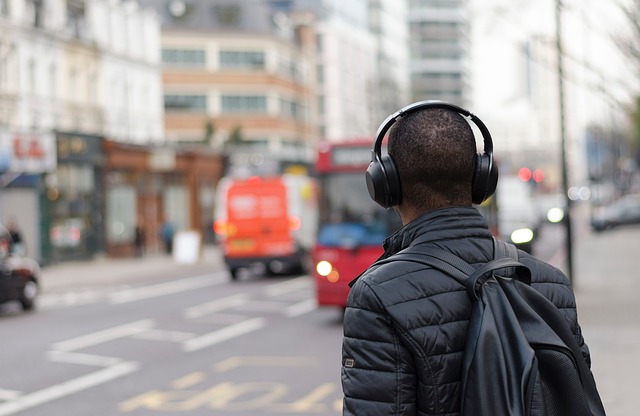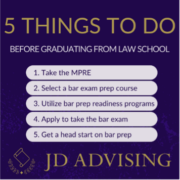Ten Common Avoidable Bar Prep Mistakes
Ten Common Avoidable Bar Prep Mistakes
Commercial bar exam companies focus on teaching bar examinees the rules necessary to pass the bar exam. However, many do not help bar examiners avoid common mistakes when studying for the bar exam! Unfortunately, these avoidable bar prep mistakes can be the reason that an examinee ultimately does not pass the bar exam. This post deals with the 10 most common mistakes to avoid when studying for the bar exam.
Ten Common Avoidable Bar Prep Mistakes
1. Not having a defined study schedule
The bar exam can be overwhelming. There are many concepts to learn, many rules and exceptions to memorize, as well as the need to be able to apply the law under time constraints. In order to have all the necessary information and skills in time for the bar exam, the students need a defined and consistent study schedule. A defined study schedule should include when to wake up in the morning, when to eat, when to study and for how long, when to exercise, and when to sleep. These are essential to performing well on the bar exam. In order to build a strong routine, students should study in 90-minute or 2-hour segments, followed by a short break (i.e., a walk) or a longer break (i.e., lunch, dinner, or exercise).
For example, a study schedule could mimic the following: (1) wake up around the same time each day, eat a healthy breakfast, and begin learning concepts until lunch; (2) eat a healthy lunch; (3) practice multiple choice questions, essays, and performance tests; (4) head out for a job or walk; (5) eat a healthy dinner; (6) focus on memorization of rules; (7) take a break by watching Netflix or crafting; and (8) go to bed at around the same time each night. It is important to note that examinees should customize their study schedule based on their performance along the way. The essential elements, however, will likely be the same as the ones mentioned above.
For more information on schedules for the bar exam, see this post.
2. Not practicing enough multiple-choice questions, essays, and performance tests.
If someone told you that their final exam was to run a mile in under 7 minutes, you would likely prepare for this final exam by running mile after mile in order to do it in under 7 minutes. There may be strength training involved, shorter and longer distance runs, and other physical activities to get ready for the final exam. But, running the mile in under 7 minutes will play a vital role in the practice leading up to the final exam. This type of repetition is the best way to prepare for the final exam.
Therefore, since the bar exam includes multiple-choice questions, essay questions, and performance tests, all of which require issue-spotting, examinees should complete practice questions so they can better prepare for exam day. They should practice with real MBE questions, released essays, and released performance tests in order to become familiar with the type of questions and proper time constraints that will be tested on the bar exam.
3. Not reassessing how one studies based on how they are doing throughout their bar preparation.
Most bar preparation courses provide students with a standard study schedule. These can be a great resource at the beginning of bar preparation! However, as the students get further and further into bar preparation, they will be able to better assess their strengths and weaknesses. At this point, they should begin to customize their study schedule to focus more heavily on highly tested subject areas where they might be struggling and moving through topics that they have already memorized. Refining study habits, study times, and focus areas are essential to being successful on the bar exam.
4. Maintaining unhealthy habits while studying.
We’re sure you’ve probably heard the phrase, “preparing for the bar exam is a marathon and ot a spring.” Most students study 40 or more hours per week for 8-10 weeks! This takes both a mental and physical toll on applicants. It is imperative that students stay healthy throughout bar prep. Regular exercise during bar preparation can help keep stress and anxiety in check, keep the mind clear and focused, and help the examinee better retain information.
Maintaining a healthy and balanced diet during bar preparation can help make learning concepts easier, will help the examinee retain more information, and can assist in keeping the examinee refreshed and alert. Finally, sleep is an essential component needed to maintain focus during long bar preparation periods. Therefore, be sure to make exercise, diet, and sleep an integral part of their bar preparation process!
For more information on staying healthy for the bar exam, see this post.
5. Not practicing under test conditions.
Another avoidable bar prep mistake is not simulating testing conditions. Taking the bar exam is stressful for everyone. Walking into the room on exam day can be extremely overwhelming. However, there are ways to help mitigate the anxiety and stress during the bar exam preparation. One of the best ways to mitigate anxiety during the actual bar exam is to spend adequate time during bar preparation practicing under the constraints you’ll find on exam day. This can be in the form of taking one or multiple full-length practice exams under timed conditions and making sure to replicate the order of sections (MBE, MEE, MPT) the bar exam tests in your jurisdiction. It is also recommended that you start practice exams at the same time of day that the bar exam will start and include any breaks, including lunch, that your jurisdiction includes.
Examinees should also take sectional tests to help prepare. Not only is this great practice, but by focusing on just a section of the bar exam, it can be a lot easier to fit into your study schedule. For example, to complete an MPT or MEE sectional test, the examinee will only need to block off a morning or an afternoon. This will help build confidence with both the material tested and timing!
For more information on how to improve your timing on the bar exam, see this post.
6. Overly relying on subject lectures
Rewatching subject lectures while studying for the bar exam can lead to diminishing returns. The lectures can be time-consuming, and there are better ways to learn the material than rewatching the videos over and over again. Using outlines to help learn concepts and to memorize rules followed by applying these concepts and rules when practicing multiple-choice and essay questions is a much better approach to learning the material.
For more information on rewatching subject lectures, see this post.
7. Not focusing on highly tested subject areas
Topics on the bar exam are not created equally. In fact, there are a number of topics on the bar exam that are worth a significant number of points, while other topics may only be tested minimally or not at all on most bar exam administrations. As an example, negligence makes up approximately half of the 25 MBE torts questions. Therefore, examinees should fully understand all the different issues that arise out of a negligence question and be prepared to fully answer them.
On the other hand, in real property, support rights and water rights make up between 0-2 questions on average on the MBE and have never appeared on the essay section of the Uniform Bar Exam. Therefore, this is a topic that students should not spend too much time focusing on during bar preparation. JD Advising outlines highlight highly-tested subject areas making it easier to prioritize during bar preparation.
Check out these posts for more information on highly tested MBE topics as well as highly tested MEE topics!
8. Spending too much time passively rereading outlines
Passively reading outlines is a common mistake students s make when studying for the bar exam. They read and reread the outlines but simply reading an outline does not always help with memorization! There are two tasks necessary to perform well on the bar exam. These are: 1. memorizing the rules, and 2. applying the rules to hypothetical situations.
Actively studying, on the other hand, has been shown to help examinees memorize and apply the law much more efficiently compared to passively studying like rereading the subject outlines. A better method is to actively review the subject outlines while taking notes, drawing pictures to help you understand the concepts, quizzing yourself as you progress through the outlines, and incrementally applying the law to different hypotheticals.
9. Not using actual MBE questions.
Some commercial bar exam courses write their own MBE practice questions for their students and do not make use of real MBE questions that have been released by the National Conference of Bar Examiners. The process of creating, refining, and vetting actual MBE questions is longer and more in-depth than most commercial bar exam courses spend on their simulated questions. Simulated multiple-choice questions are prone to being too open-ended, partially incorrect, or fully incorrect. This leaves examinees who rely solely on these types of questions to be less prepared for the bar exam than those bar examiners who utilize actual MBE questions.
Previously-used MBE questions, on the other hand, were tested on past MBEs and are likely closer to what will be tested on the MBE portion of the bar exam. Actual MBE questions usually do not have internal inconsistencies, usually are not left open-ended, and are overwhelmingly correct applications of correct law. While examinees can practice with simulated MBE questions, they should make it a point to practice with real MBE questions in order to give them practice with the types of questions most representative to those they will encounter on the bar exam.
10. Relying too much on flashcards
The last of our avoidable bar prep mistakes is relying too much on flashcards. Flashcards can be a good tool to help memorize rules of law. However, some students use flashcards for everything and end up spending too much valuable time trying to create them. For example, writing every rule that might be tested on the bar exam on a flashcard is not a good use of time. There are way too many rules for this approach to be beneficial! A better way to use flashcards is to only write out rules a student might have difficulty remembering. If the number of rules is still too many, the examinee can focus on highly-tested rules that they are having trouble memorizing.
We hope these tips on avoidable bar prep mistakes are helpful!
Looking to Pass the Bar Exam?
Free Resources:
- 🌟Bar Exam Free Resource Center: Access our most popular free guides, webinars, and resources to set you on the path to success.
- Free Bar Exam Guides: Expert advice on the MBE, the MEE, passing strategies, and overcoming failure.
- Free Webinars: Get insight from top bar exam experts to ace your preparation.
Paid Resources:
- 🏆One-Sheets: Our most popular product! Master the Bar Exam with these five-star rated essentials.
- Bar Exam Outlines: Our comprehensive and condensed bar exam outlines present key information in an organized, easy-to-digest layout.
- Exclusive Mastery Classes: Dive deep into highly tested areas of the MBE, MEE, MPT, and CA bar exams in these live, one-time events.
- Specialized Private Tutoring: With years of experience under our belt, our experts provide personalized guidance to ensure you excel.
- Bar Exam Courses: On Demand and Premium options tailored to your needs.
- Bar Exam Crash Course + Mini Outlines: A great review of the topics you need to know!
🔥 NEW! Check out our Repeat Taker Bar Exam Course and our new premier Guarantee Pass Program!







Leave a Reply
Want to join the discussion?Feel free to contribute!